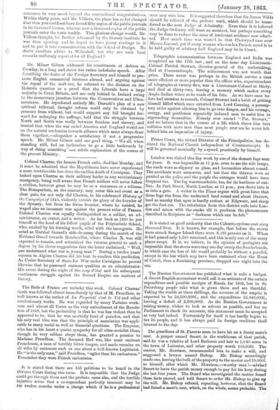Telegraphic communication between England and India was completed on the
17th lust , and on the same day Lieutenant- Colonel Patrick Stewart, director-general of the undertaking, died at Constantinople. The achievement was not worth that price. There never was perhaps in the British service a man more efficient or more popular than the officer who, superintendent of telegraphs at twenty-five, was a Lieutenant-Colonel at thirty, and died at thirty-two, leaving a memory which makes every Anglo-Indian wince as he reads of his fate. As we have once be- fore had occasion to remark, Colonel Stewart had a habit of getting himself killed which once extorted from Lord Canning a peremp- tory order against allowing him to go into danger, and his courage, energy, and gentleness repeatedly induced men to assist him in superseding themselves. Nobody ever envied " Pat. Stewart," and we believe that in the course of a life which threw him into collision with More men than most people ever see he never left behind him an impression of injury.
































 Previous page
Previous page